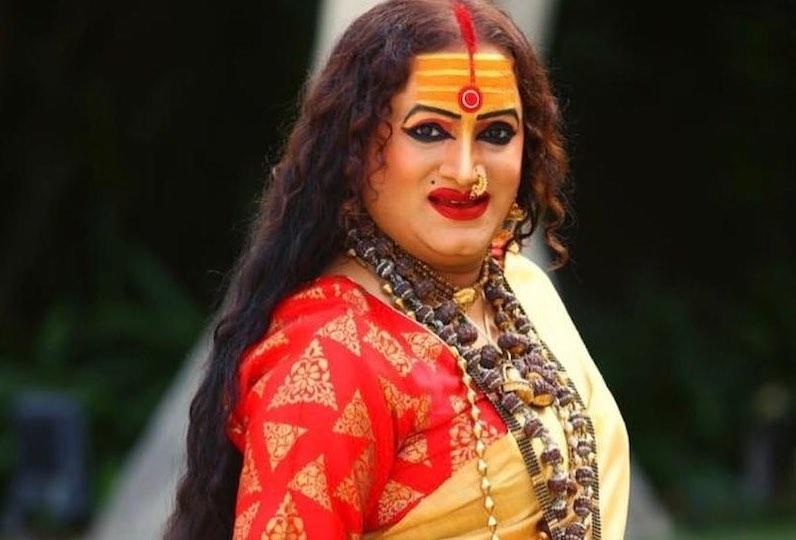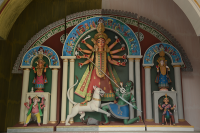 Image
Image
Life and struggle are synonymous: Laxmi Narayan Tripathi
Transgender/Hijra rights activist, actor, dancer and choreographer Acharya Mahamandaleshwar Laxmi Narayan Tripathi was the guest at Kalam Vishesh organised by Prabha Khaitan Foundation and presented by Shree Cement. In an exclusive chat with entrepreneur Apra Kucchal of Ehsaas Women of Jaipur, Laxmi Narayan Tripathi spoke about her struggle in life and rise to the rank now she holds. IBNS correspondent Souvik Ghosh brings highlights
You have fought with yourself, your near ones and then with the outside world? Take us back to your journey.
It is not easy to become a woman in life. Kinnar, transgender come later. It is a huge struggle to become a woman. The struggle happens with the patriarchal society. My case was completely different. I was born male but I did not accept it. I used to consider myself as a woman. So the struggle was within. I never felt that I was different from others in the society but the society made me realise that. Sometimes I feel life is the name of a struggle.
But if we learn to walk with a smile then life does not remain a struggle but an easy route. I have learnt that. There was a point in my personal life where I was a part of an abusive relationship from which I came out. So I was fortunate to live every phase of my life as a woman. Life and struggle are synonymous.
India has a dearth of literature on hijra community. Your two books have filled the vacuum and opened various avenues. What was the inspiration behind writing those two books?
Vaishali Raode had written Main Hijra... Main Laxmi (her first book) very well for me. It was also translated in Hindi, English and Punjabi. Now it is going to get translated in Odiya. I was hesitant to write the book first when Vaishali Raode ji had approached me. But she insisted me to write the book on transgender people. She inspired me saying my quality, struggle of life were different so she wanted me to write the book. The second book Red Lipstick: The Men in My Life is about all men including my father who came to my life till the time it was written. Now I am planning to write a third book, Main aur Dharma. I feel this book is very important as there is a need for a different narrative of dharma or religion. There should be a book of religion from my perspective.
.jpg)
How do you view the Guru-Chela parampara (lord-devotee tradition) scenario which is considered pious in your community?
Even today all elderly people believe in the tradition. How can there be knowledge without guru? Today I am an Acharya but earlier I was a guru in the Kinnar community. In the Kinnar community, every chela has the right to choose a guru. If a chela is not satisfied with a guru, he or she can choose someone else. So this tradition is very strong among us and also has a beauty of itself. There is a huge difference between the time when I was a chela and now in 2021. Now our chelas are holding different positions in life. I want all my chelas to be into different professions like any other normal person. I want all my chelas to be modern not losing their own culture and background.
.jpg)
You always give importance to education unlike your community. So what are the steps you are undertaking to ensure education to all people in your community?
There was a generation which did not believe in education. But the world is changing now and education has become important. The kinnars are sent to good educational institutions, top boarding schools. We need knowledge to earn bread but education forms the foundation of that knowledge. I feel it is utmost important to have knowledge. I still consider myself as a student and keen to learn even in my 40s. I feel the education system in our country needs to change and become of a realistic India like earlier days.
This community is still not wholeheartedly accepted in our society. How do you think this needs to change?
I think the government needs to have a detailed advocacy plan and frame strict laws. The existing Act needs to be stricter and non-discriminatory policies need to be adapted. We need people in various jobs who is productive and not a man or a woman or a transgender. A society will bloom only when a person is not discriminated on the basis of gender. I believe in this and this is why I feel, non-discriminatory policies are significant.
You had a big contribution in making transgender an official gender. As a result people are leading an easier life now. Do you think situation has gone better?
I fought for my self respect and values first. It is never easy to fight a courtroom battle but we had no other way or a vote bank (so no help from politicians). Politicians are important for framing laws but our legal system is supreme in giving an opportunity to all people to live with full respect. One has to fight for his or her own right.
.jpg)
Top Headlines
-
Art and Culture
Rich tribute to Bhupen Hazarika at Kolkata Book Fair marks birth centenary
January 29, 2026
-
Art and Culture
Kolkata Vistiwalas: The Last Bearers of Water
January 16, 2026
-
Art and Culture
Beyond Old and New: Bickram Ghosh and the Art of Fusion at Serendipity
December 25, 2025
-
Art and Culture
Saptak Music School of Pittsburgh hosts spellbinding evening of Indian classical music
September 23, 2025
-
Art and Culture
Zigzag to clarity: Sonal Mansinghs dance of life captivates Delhi
September 08, 2025
-
Art and Culture
USA: Santoor Ashram Kolkata mesmerises Los Angeles with a celebration of Indian classical music
August 27, 2025
-
Art and Culture
'Feels like a tonic in my musical pursuits': Flute virtuoso Pandit Ronu Majumdar receives Padma Shri
June 06, 2025
-
Art and Culture
Of Paris, a chronic pain and a pivotal friendship: Frida Kahlo meets Mary Reynolds at the Art Institute of Chicago
April 16, 2025
-
Art and Culture
Prabha Khaitan Foundation celebrates 'Vasant Utsav' at Indian Museum Kolkata
March 15, 2025
-
Art and Culture
Musical concert 'Ami Bhalobashi Bangla Ke' to be held in Kolkata on April 19
February 20, 2025

